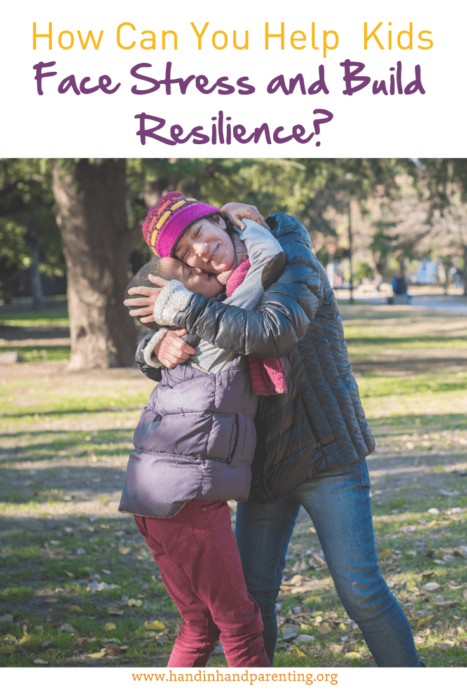
Sometimes the things our children experience can feel really life or death for them, and their upset can trigger us. We might immediately move into fix the situation, to ease their stress and make things better. Although we do this because we care so much, kids build resilience when they work through these difficult life experiences while feeling our guidance and support. And since we cannot always be there when our children meet challenges, we want them to be able to draw on skills that help them thrive.
So how can we guide our children when they face obstacles?
In this post, Hand in Hand Instructor Stephanie Parker recalls a time her child faced a challenge in school. She was confident that her daughter could face what she saw as a big setback and move forward.
Rather than demand a school meeting, she decided to try a few strategies that helped her child gain openness and confidence with a new situation.
Read on to find out how Stephanie helped her child deal with the stress of a tricky situation and move through it to brighter times.
Model Calm When Things Get Hard
“My soon to be 10 year old daughter started going to school 3 months ago. Up until then she'd been home schooled but we both decided it was time for a new experience and my daughter was very keen to see what school was like.
“She went to school for 3 weeks before breaking up for the Christmas holidays. Everything was going really well and she was enjoying her new experience, but when she went back after the holidays, all the children had to swap to a different table in the classroom and sit with other children. My daughter was happy because she thought that she was going to sit next to a girl she liked.
“However when I picked her up after school she looked very unhappy. As we walked away from the school she told be that half way through the day she had been moved again and now she was sitting next to a boy who has ADHD. This was not what she wanted because she said the boy was quite distracting and noisy.
“The next day when I picked her up she looked even more upset and as we began to walk home she burst into tears.
She told me that it was awful sitting next to this boy. He got into her personal space a lot and he would spit. The tears continued to roll down her face as she shared how heartbroken she was. It felt to her like the world was ending and that school would be awful from now on.
Listen, and Empathise Instead of Fixing
Listen to Stephanie tell this anecdote.
I listened to her, and kept the perspective that the situation could be worked through and resolved. I also didn't feel at this time that I needed to ‘fix' anything by rushing to the teacher and demanding that my daughter sit somewhere else immediately.
She cried for most of the way home as I continued to listen and emphasize. She wasn't cross with the boy in any way. She understood that he couldn't help the way he was, but she was cross with the teachers for sitting her next to him.
When we were almost home, she started to brighten up a little and I suggested that we could bring this issue into our play.
Work Through Issues in Play

We'd been playing with Lego Friends for the last few days and as part of our game we'd been running a creche. I wondered out loud if one of the children in the creche could have ADHD.
My daughter actually looked delighted at this and said she thought it was a great idea.
We've often brought issues into our play like this, so that my daughter can act out these things outside of herself. She has the chance to play the more powerful role as she gets to be in charge in a way that she doesn't always feel in life.
At Hand in Hand Parenting we call this kind of play Playlistening. It can really bring about big and positive change.
The next day when I picked her up from school she was a lot brighter and said the day had gone much better. Since then, it's been much easier. In fact my daughter has come out of school telling me how intelligent this boy is and how much she's enjoying having his Teaching Assistant help her as well as him (A definite perk of sitting next to him!)
Sometimes it's tricky when he gets cross suddenly or has a tantrum, but she's navigating this without any upset or tears and comes out of school feeling happy most days
I'm really glad I could help her to stick it out and grow through the experience – now it feels like we made it together to the other side.
Our children are naturally resilient and fully able to work through the challenges that life can throw at them. Use these strategies to help them flex their resilience.
Strategies That Help Your Child Cope With Stressful Situations
- Keep Open – It can be tempting to jump in with a quick-fix solution, but try and resist.
- Keep Close – Listening to whining and upset can feel like your child is pushing you away and can feel unbearable. Listen to them like you might a good friend, letting them spill all the worry, upset and frustration they have. If you want to say anything try just saying softly, “I'm sorry it's hard,” “That must be difficult.” “Ouch! Poor you.” Just giving them this space allows them to shed lots of the worry and tension they may feel.
- Foster Your Connection – Children find it easier coping with changes and challenges when they can really feel your unconditional love and support. Spending regular one-on-one time fosters closeness and trust and really empowers your child. You can read more about how to do this here in this free chapter from our book.
- Switch Things Up – Provide opportunities to use play to put your child in control of a situation, like Stephanie did with the creche game. This gives your child new perspectives and allows kids to feel power they don't normally have, and experiment with controlling a new outcome. If your child is scared of dogs, you might have your child pick a plushie dog, adopt and train him, or role model acting dogs. A child who is scared about playing soccer can benefit from winning goal after goal as you clown around and miss his shots.
- Take “safe risks” – Risk-taking helps expand your child's comfort zone, naturally building their resilience. Try some risky play – you can hear more about why it's so important in this podcast – or do something you haven't before, like start a new sport, or taste some exotic food, to get into the habit of experiencing new things.
- Model Failure – When you mess up, tell your kids, laugh a little and move on. When you show them that failure is a learning experience, you'll pass on the confidence that even if your children get knocked down, they can get back up. After all, you'll be there waiting for them! This thinking reduces anxiety and boosts a growth mindset.
- Keep Positive – You'll anchor your children in their stressed times when you can keep positive and show them they have all they need to survive and thrive. Telling them, “You have everything you need to figure this out,” or “I don't know how it will work out but I know we will find a way,” are good, strong words in times of uncertainty.
Use these strategies when your child hits a crisis and you'll guide them well as they overcome and move on.
